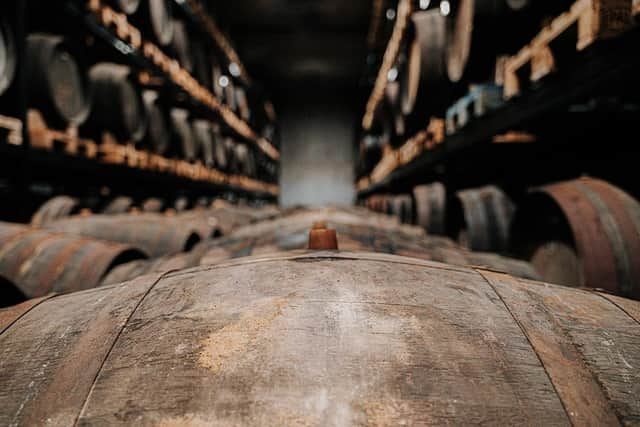Estate planning: how whisky cask investments can mature as you do, with a few extra perks along the way


If you’re looking ahead to retirement and beyond, there is a reason why whisky investment is the phrase on everyone’s lips.
Scotch whisky has become an increasingly popular investment option if you are looking for long-term gains – and buying up whisky casks now can offer a wealth of benefits when it comes to planning your estate.
Market stalwart Vintage Acquisitions was set up in September 2011 as trading specialists focused on luxury drinks and fine wine for discerning private clients. After being awarded a coveted Warehouse Keeper and Owners of Warehouses Goods Regulation (WOWGR) certificate by HMRC, the company’s founders decided to specialise almost exclusively in Scotch whisky and now stock up to £2 million of whisky ready to trade to their clients.
Why invest in whisky
Whisky casks present an appealing alternative to the performance of more traditional investment options if you are in it for the long haul. The longer it is held in the cask the more the whisky naturally improves – and as the years pass, it becomes rarer as well as tastier, making it even more valuable.
The approach to investing in whisky is equally straightforward. Vintage Acquisitions (trading name of Brooks & Whitaker Limited) work directly and indirectly with the best Scottish distilleries to offer some of the rarest casks to buyers both here in the UK and all over the world.
The team offer a completely transparent purchase process from the initial discussion about your requirements to receiving your certificate of title. Once you've bought your cask(s), you simply sit back and wait for it to gracefully mature before deciding when the time is right to exit the market; with a number of options available, Vintage Acquisitions can help you navigate the sale or you can even opt to have your whisky bottled with their sister company, Vintage Bottlers.


And that’s not the only reason to make this liquid gold your chosen asset for yours and your children’s futures.
“There have been some record sales in the past few years,” says Sam Brooks, the company’s MD and founder. “Last July a private collector in Asia paid £16m for Cask No 3 from the Ardbeg distillery on the Scottish island of Islay, a cask of single malt dating back to November 1975.”
Just a month beforehand, a cask of The Macallan 1988 sold at auction for £1m, after being bought 34 years earlier for just £5,000.
So what should you consider when planning the future of your estate, including any investments such as whisky?
Alleviating inheritance tax
When you die, inheritance tax is payable on your estate: anything over the threshold of £325,000 (the nil-rate band (or NRB) on which you don’t have to pay inheritance tax) will be taxed at 40%.
However, if you have built up a cask portfolio, you can gift those casks to your children or grandchildren; after seven years, the casks come out of your estate and are therefore exempt from inheritance tax. The technical term for this seven-year rule is a Potentially Exempt Transfer – it applies to any gift, and also means there is still less inheritance tax if you pass away before the seven years is up through a process known as taper relief.
No tax on the profit when you sell
All investments are subject to capital gains tax at 20 per cent, with the exception of ISAs; for property, it's 28 per cent. We all have a capital gains tax-free allowance of £12,300 per tax year – but in April, this will be reduced to £6,000, and then cut to just £3,000 from April 2024.
Ironically, whisky is classed as a wasting asset by HMRC, meaning it is considered to have a “predictable life that does not exceed 50 years”. The great news is that whisky isn’t subject to capital gains tax, meaning you don't have to pay tax on the profit when you sell it on.
“As the starting point at which we have to pay capital gains tax gets lower and lower, cask whisky investment is becoming more appealing to a lot of our clients,” says Sam.
How do I arrange ownership?
There are two ownership options available to Vintage Acquisitions’ clients:
Option 1 - independent: You receive a delivery order for your cask(s) if you hold a private account with an HMRC approved excise warehouse. All storage, insurance and cask management costs become your responsibility from the date the delivery order is issued.
Option 2 - custodian: Your cask(s) will be stored under Vintage Acquisitions’ WOWGR licence at one of their twenty four HMRC approved excise warehouse accounts. The company becomes the custodian of the cask, but you remain the legal owner and beneficiary via the paperwork you obtain. You will receive a wet-signed and stamped certificate listing all the unique data linked to your cask(s) (its unique cask number, ABV, OLA/RLA, location and so on).
What if there are any issues with Vintage Acquisitions?
In the very unlikely event of the company ceasing to trade or going into liquidation, the wet-signed/stamped certificate of ownership - along with your original invoice and paid invoice receipt, plus proof of payment from your bank - proves you are the legal owner, and your cask(s) would not be included in any assets that are liquidated.
Discover more about cask whisky
To find out more about investments and planning your estate, visit the Vintage Acquisitions website to download your free Whisky Cask Ownership Guide at www.vintageacquisitions.com.
This is paid-for content on behalf of Vintage Acquisitions, and does not necessarily reflect the views or advice of The Star. As with all financial investments, your investment may go down as well as up, and people are recommended to take financial advice.